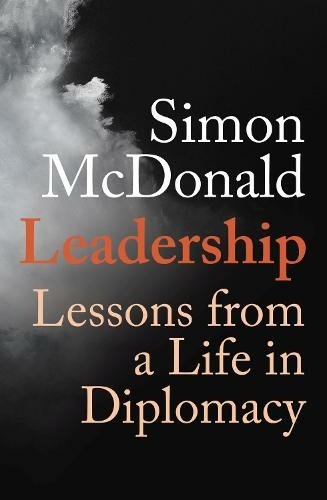Leadership: Lessons from a Life in Diplomacy by Simon McDonald is three books in one. It’s part memoir, detailing some of the extraordinary stories behind foreign-policy headlines from the 1980s through to 2020. It is also a compelling prescription for reforming some of the UK’s political institutions. Lastly, it’s a sequence of reflections, drawing on Simon’s experiences of what makes a “good” leader.
As a memoir, we begin with Simon’s early career and meet his role models, and informal mentors. He takes us through his various postings, the people he worked alongside, and the challenges he faced. He then draws on what this means for a leader. A standout section is his discussion of joining the embassy in Bonn, Germany, in 1988 where he felt leaders prioritised giving advice that made the centre “happy” but that didn’t reflect how quickly Germany was changing at the time. Simon reflects on what this early lesson meant for his approach to leadership – leaders shouldn’t be “imperious” and there isn’t a lot of joy in working for an ineffective one.
The reader follows Simon’s story as he progresses into the senior echelons of the Foreign O�ffice, becoming the PPS to the foreign secretary, and advising Gordon Brown directly on the Iraq War. His sense of ambition propels you through the memoir elements of this book, charting his story, from the public service ethos and values embedded during his Salford upbringing to becoming permanent secretary at the FCO. Through memoir, we see Simon increase his emphasis on the personal – a good leader lets their team know “what they care most about”.

❱ Leadership: Lessons from a Life in Diplomacy
❱ Simon McDonald (2022)
❱ Haus Publishing
Memoir also underpins his prescriptions for reform which are mostly brought together in the final chapter of the book. He says that post-Brexit, we need to “spruce things up” and fix fundamental institutions including the monarchy, the cabinet, the civil service and parliament. The most interesting arguments are about the institutions he is closest to, grounding these in lived and learnt expertise. Some recommendations are very precise, particularly on reducing the size of the House of Lords and increasing its democratic legitimacy.
The most moving sections reflect on where Simon felt he could have gone further to reform the civil service once he’d become a permanent secretary. Notably, he describes bullying as “the single thorniest issue we failed to tackle”. This experience leads to sensible recommendations for an independent process and stronger consequences for those investigated. A must-read section for those who have the power to effect change and tackle bullying, harassment and discrimination in the service today.
This book is a deeply personal take on leadership, rather than an academic text on the subject. It connects Simon’s unique experiences to what could be done differently by those in positions of senior leadership. At different points, he collates what he sees as attributes for a good leader but, out of these, he concludes that leaders should be: “clear, consistent, curious, collaborative, courageous and compassionate”. These are familiar principles few would argue with, but there is less to learn from his writing on how to live those values as a leader. Simon’s reflections on senior leaders seem to be referring to seniority of position rather than the more democratic view that regardless of grade, people are leaders in their own way. But that doesn’t mean that someone who isn’t a permanent secretary cannot learn anything from Simon’s experiences.
Yet in having this three-in-one approach, the overall message for the reader gets a little lost. Two chapters, ‘The Good Leader’ and ‘Leadership at the Centre’ are most guilty of this. You are swiftly pivoted from reflections on the qualities of a good leader only to find yourself in an extended analogy likening life in No.10 to the Royal Court of King Henry VIII – and then to potential motivations behind the vote to leave the EU. Both chapters eventually return to reflecting on leadership but could have been bought together more cohesively.
For a reader whose background is different from the majority of people we meet in this book, there is a preoccupation with class and title that feels, at times, alienating. Reassuringly, Simon feels that the civil service is a place “where excellence is now more democratic”. But it is also one where patronage is an unacknowledged “spectre”. Simon should go further and critically consider if patronage really should be the ordering principle of recruitment into the most senior ranks of the civil service. That said, the book brings to life experiences of the “hidden” rules of recruitment detailed in the Social Mobility Commission’s Navigating the Labyrinth report.
As a memoir, a plan for reform and a reflection on its titular theme, Leadership forms an important part of Simon’s legacy as a senior civil servant and would be a valuable addition to the bookshelves of readers interested in any one of those subjects.
Jessica Nightingale is a civil servant working for DfE in Manchester